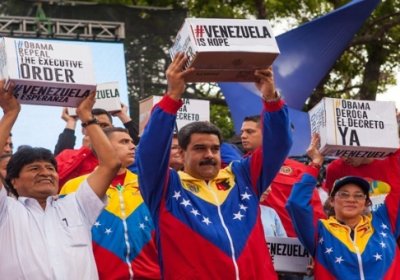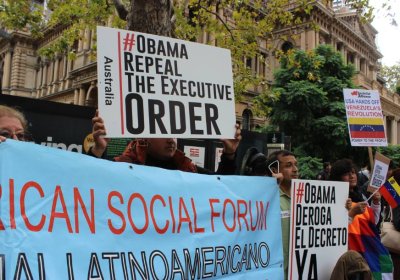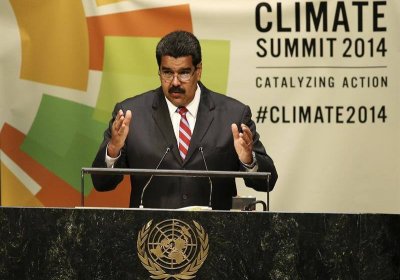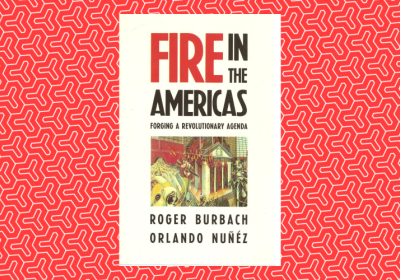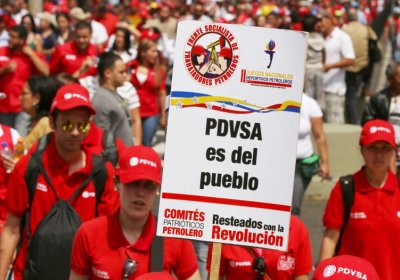Internationally awarded Uruguayan author and journalist Eduardo Galeano died on April 13 of lung cancer at age 75 in Montevideo, the capital of Uruguay.
Latin America & the Caribbean
Venezuelan President Nicolas Maduro, along with his Bolivian counterpart Evo Morales, received a petition with 10 million signatures against U.S. President Barack Obama's executive order labelling the country as a “security treat” on April 9.
After the decree was issued, Maduro launched a campaign seeking 10 million signatures from Venezuelans demanding the decree be repealed, saying he would present them to the U.S. President Barack Obama at the April 10-11 Summit of the Americas in Panama.
US President Barack Obama admitted on April 9 that Venezuela “does not pose a threat” to the United States.
“We do not believe that Venezuela poses a threat to the United States, nor does the United States threaten the Venezuelan government,” Obama said during an interview with EFE.
Last month, Obama signed an executive order declaring Venezuela an “unusual and extraordinary threat to the national security and foreign policy of the United States.”
The Venezuelan government-initiated campaign calling for US President Barack Obama to repeal his executive order that arbitrarily declares Venezuela an "extraordinary threat" to US "national security" had more than 6 million signatures as March 31.
Venezuelan President Nicolas Maduro announced on his weekly television program that the campaign has collected 6.2 million signatures so far. “I believe that Obama's threat has awoken a great amount of love for what we are going for in our country,” said Maduro.
Since US President Barack Obama's administration decided to impose new sanctions on Venezuela on March 9, many people, including journalists, have asked what motivated them to do this.
Some are curious over the apparent inconsistency between this move and the White House decision in December to begin normalising relations with Cuba. Others are wondering why the Obama administration would do something that so obviously hurts the United States-backed opposition in Venezuela, at least in the short run.
The Argentine government urged the British government to return to the negotiating table over the Malvinas Islands on March 25, TeleSUR English said.
It comes in response to a planned “beef up” of British military presence on the disputed islands off the coast of South America that Britain occupies.
In a statement, Argentina's foreign ministry described Britain's “growing militarisation” of the disputed islands as “absolutely unjustifiable”.
Venezuelan President Nicolas Maduro announced the creation of the Ministry of Ecosocialism and Water, which will be tasked with protecting the environment in the context of Venezuela's bid to build “21st century socialism”.
The new body will supervise the National Water Plan, designed to ensure public access to water, as well as the Tree Mission, which involves the community in reforestation efforts.
As Palestinians continue to face economic hardships and services and housing shortages after the Israeli bombardments last year, dozens of Gazans joined a rally on March 21 in solidarity with Venezuela.
TeleSUR’s correspondent in Gaza, Noor Harazeen, reported from the rally that attendees were calling for the US to keep its hands off Venezuela.
The event was organised by the Popular Front for the Liberation of Palestine (PFLP), and several Palestinian officials attended, including Sami Abu Zuhri from Hamas.
A great companero, colleague and friend, Roger Burbach, passed away on March 5 at the age of 70. I had the privilege of working with Roger on a book we co-authored, together with Michael Fox, titled Latin America’s Turbulent Transitions: The Future of Twenty-First-Century Socialism.
Right-wing protesters swarmed ministerial buildings in the Brazilian capital Brasilia and along Copacabana beach in Rio de Janeiro on March 15.
The protests were part of nationwide demonstrations calling for the impeachment of Brazilian President Dilma Rousseff.
Huge protests took place in 65 cities across the country, involving hundreds of thousands of people. Protesters claim that the recently elected president should be impeached due to a corruption scandal in the state-owned oil company Petrobras.
Thousands of workers from public companies took part in an anti-imperialist march in Caracas on March 18, TeleSUR English said that day. They demanded the US government retract its labelling of Venezuela as a “threat”.
Four days earlier, more than 100,000 Venezuelans mobilised throughout the country for a series of national military exercises in defence of their national sovereignty, Venezuelanalysis said on March 16.
On March 9, US President Barack Obama issued an excutive order imposing more sanctions of Venezuelan officals and declaring the oil-rich nation a “national security threat”. It came after a long period of often violent right-wing protests and economic shortages facing the left-wing Chavista governmetn of President Nicolas Maduro.
- Previous page
- Page 79
- Next page

